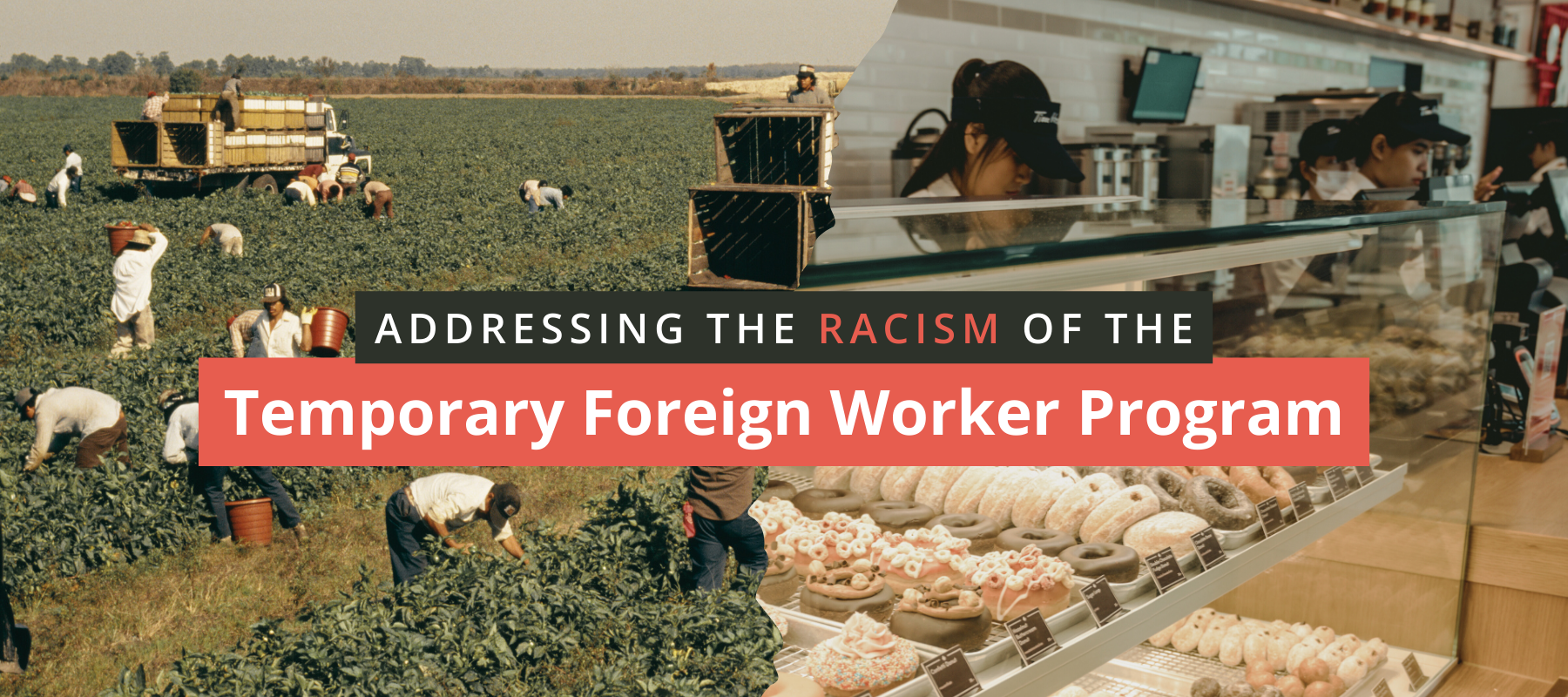Addressing the racism of the Temporary Foreign Worker Program

There is renewed attention on Canada’s Temporary Foreign Worker Program (TFWP) in the wake of the recent damning report from the UN Special Rapporteur on Contemporary Forms of Slavery that calls the program “a breeding ground for contemporary forms of slavery.”
Yet, the central critiques and recommendations made in the UN report are being ignored by too many.
Some pundits have been stoking racism and xenophobia by linking Canada’s affordability crisis to the spike of temporary foreign workers entering the country in recent years. The federal government has responded by reducing the share of temporary workers that companies in certain industries can hire.
But this focus on the number of people engaged through the TFWP dangerously oversimplifies the problem.
It turns a blind eye to the impact of growing corporate speculation and profits on the cost of housing and groceries and ignores the systemic racism and exploitation embedded within the program’s design. As the UN report notes, “the recent policy shift to reduce the number of temporary residents will not address the challenges faced by those who continue to enter through the same programmes.”
So what mechanisms of the TFWP does the UN report condemn and what policy changes does it propose?
The problem is not the numbers—it’s the system
The core issue underscored in the UN report is how the TFWP program is structured to disadvantage and exploit racialized workers from the Global South.
The TFWP “institutionalizes asymmetries of power that favour employers and prevent workers from exercising their rights,” the report explains. Insecure status and closed work permits that tie workers to a single employer prevent workers from exercising basic rights such as changing jobs without facing severe repercussions up to deportation. The program’s design, along with federal and provincial government neglect, makes workers reliant on these employers for housing, access to healthcare and essential information about their rights and services available to them.
The result is a workforce that is vulnerable to abuse, with little to no recourse for justice.
Migrant workers, researchers and organizations that provide support to migrant workers have been documenting these systemic abuses for decades. Our colleagues recently published a study on the adverse health impacts of inadequate employer-provided housing on migrant workers in Ontario and BC.
The program’s design makes workers reliant on employers for housing, access to healthcare and essential information about their rights.
The program’s design flaws are not an accident but a feature that serves the interests of employers, particularly large-scale corporations.1.
Undergirding the program is a globalized capitalism that relies on depleting the Global South of its resources and devaluing the labour of its racialized populations. The TFWP perpetuates these global racist dynamics by allowing businesses in Canada to tap into this ‘cheap labour’ through captive and insecure conditions while minimizing their obligations to these workers.
The growing misuse of the TFWP may contribute to a ‘race to the bottom’ in some of the sectors that use it most, but that downward pressure on wages is most felt by the predominantly racialized recent immigrants overrepresented in these sectors. The new federal restrictions on the number of TFWs will do little to address these impacts and do nothing to reduce abuses workers’ face.
Migrant workers do not depress wages, employers do. Governments allow stagnating wages, systematic underfunding of public services, speculation and corporate greed to fuel the affordability crisis. Migrant workers are made the scapegoats.2.
Moving forward: five key policy recommendations in the UN report
The UN report includes recommendations for overhauling the TFWP that echo changes advocates and migrant workers have long been calling for.3. These include:
1. Ending the use of closed work permits: “Allowing all workers the right to choose and change their employers in any sector without restriction or discrimination” would go a long way to mitigate the power imbalance that currently allows for workers’ exploitation.
2. Offering permanent residency: All workers should have permanent residency from the time of their arrival in Canada. This would acknowledge the permanent need for their labour and provide them with the security to fully exercise their rights. This process must include regularizing workers who have lost status.
3. Improving oversight and accountability: The lack of clarity on which federal or provincial body is responsible for providing support to migrant workers and overseeing their fair treatment leaves workers vulnerable to abuses. The report recommends “ending interjurisdictional neglect by mandating or creating a single coordination body with full oversight of migrant workers’ rights and conditions and ensuring that all federal, provincial, territorial and municipal actors are regularly engaged and sensitized about their responsibilities.” This includes ensuring rigorous, proactive surprise inspections are regularly conducted.
4. Ensuring equal access to social services: Migrant workers must have equal access to public services, including settlement services and healthcare. These services should be provided without discrimination and tailored to the needs of migrant workers. This includes, “providing equal access to adequate housing without discrimination, in line with the National Housing Strategy Act.”
5. Protecting workers’ right to unionize: “All workers should have trade union rights,but barriers exist for migrant workers,” the report states. Workers must have access to collective organizing rights and union representation in addition to being protected by federal, provincial and territorial labour rights and occupational health and safety.
The UN Special Rapporteur finds that while Canada enjoys a reputation for welcoming immigrants, this is not the reality for TFWs. It notes the program provides a legal framework for the mistreatment of a racialized migrant workforce. Canada is failing to uphold international human rights, including our failure to sign onto the International Convention on the Protection of the Rights of All Migrant Workers and Members of Their Families.
British Columbia’s role in addressing exploitation
While the racist design of the TFWP is a federal responsibility, provinces have a critical role to play in protecting migrant workers from exploitation. Oversight of working conditions falls primarily to provincial governments and in BC this oversight has been alarmingly inadequate. The province has failed to enforce labour, housing and health standards effectively, leaving workers in dangerous situations.
As BC employers’ increasingly use the TFWP, outdated provincial policies keep wages low, limit employment protections and hinder access to collective organizing in the sectors that rely on the program most. These policies contribute to undervaluing the labour of those who work in these sectors regardless of their status.
BC and the federal government must work together to ensure that all workers are allowed to “enjoy the full spectrum of their human rights, while continuing to contribute to Canadian society,” the Special Rapporteur’s report says.
Notes
1. Henway, Mostafa (August 18, 2024), “Liberals and Tories perfected the exploitation of migrants for big business,” The Breach, https://breachmedia.ca/liberals-and-tories-perfected-the-exploitation-of-migrants-for-big-business/.
2. Hussan, Syed (August 16, 2024), “The anti-immigrant backlash arrives in Canada,” The Breach Show, https://breachmedia.ca/theshow/.
3. See, for example, Jamaican migrant farmworkers’ 2022 open letter, the Migrant Worker Health Expert Working Group’s 2023 open letter, the Migrant Workers Centre’s 2023 open letter, Justicia for Migrant Workers’ open letter, the UFCW’s annual report on the status of migrant workers, the Worker Solidarity Network’s climate and labour campaign and the CCPA-BC’s own reporting, among many other campaigns and reports.
Topics: Employment & labour, Immigrants & refugees, Racism & racial justice


